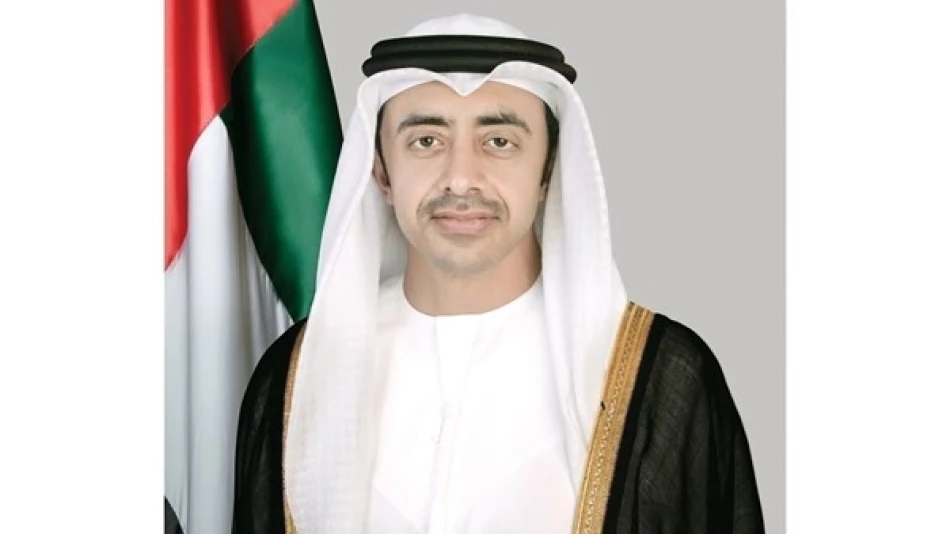
UAE Envoy Reaffirms Commitment to Shared Efforts for a More Peaceful World
UAE Pushes for UN Reform as Global Crises Mount
The United Arab Emirates is leading a diplomatic charge to reshape the United Nations into a more effective global institution, as Sheikh Abdullah bin Zayed Al Nahyan heads the country's delegation to the 80th UN General Assembly in New York. With conflicts raging worldwide and climate challenges intensifying, the UAE sees this moment as critical for fixing multilateral cooperation before it's too late.
Why UN Reform Matters Now
The timing isn't coincidental. The UN faces its biggest credibility crisis in decades. From Ukraine to Gaza, the Security Council has been paralyzed by vetoes. Climate commitments keep falling short. And emerging challenges like AI governance have no clear international framework.
Sheikh Abdullah put it bluntly: "When we look ahead to the next eight decades, the United Nations must be more flexible, efficient and effective." He's talking about fundamental changes, not cosmetic tweaks.
The UAE's Strategic Calculation
For the UAE, this push makes perfect sense. As a middle power that relies heavily on international trade and investment, the country needs stable global institutions. But there's also a competitive angle here.
While other regional powers like Saudi Arabia focus more on bilateral relationships, the UAE is betting that multilateral leadership will pay bigger dividends. It's the same strategy that made Dubai a global hub - position yourself as the reliable partner when others can't get along.
What's Actually on the Table
The UAE's agenda goes beyond typical diplomatic rhetoric. They're pushing specific reforms:
Security Council expansion: Though not stated directly, UAE officials have long supported adding more permanent members to break current deadlocks.
Climate action authority: The UAE wants the UN to have stronger enforcement mechanisms for climate commitments, building on their COP28 presidency experience.
AI governance framework: They're launching a global dialogue on artificial intelligence regulation - smart timing as governments worldwide scramble to understand the technology.
The Women's Empowerment Angle
The UAE is also emphasizing women's roles in peace and security. This isn't just progressive posturing - it's practical politics. Countries with higher female participation in peace processes see more durable agreements, according to UN data.
For the UAE, championing women's issues also helps counter criticism about domestic restrictions and positions them as reformers rather than traditionalists.
Market and Investment Implications
This diplomatic push has real economic consequences. A more effective UN could mean:
Better conflict resolution: Faster resolution of trade disruptions and supply chain issues when regional conflicts emerge.
Clearer climate rules: More predictable carbon pricing and green investment frameworks that businesses desperately need.
Tech regulation coordination: Rather than navigating different AI rules in every country, companies could work within one global framework.
Comparing Regional Approaches
The UAE's multilateral focus contrasts sharply with neighbors. Saudi Arabia has focused more on bilateral deals and regional leadership through organizations like OPEC. Qatar leveraged sports diplomacy and media influence. The UAE is betting that institutional reform will have longer-lasting impact.
This mirrors successful small-state strategies elsewhere. Singapore built influence through trade facilitation and neutral diplomacy. Switzerland became indispensable through financial services and humanitarian leadership.
The Reality Check
But here's the problem: UN reform is notoriously difficult. The Security Council structure hasn't changed since 1965. Major powers like the US, China, and Russia have little incentive to dilute their influence.
Previous reform efforts have largely failed because they threatened existing power structures. The UAE's challenge is proposing changes that make the UN more effective without triggering opposition from permanent members.
What Success Would Look Like
Even modest progress could be significant. If the UAE helps create new mechanisms for climate enforcement or AI governance, that builds their reputation as problem-solvers. It also gives them influence over rules that will shape global trade and investment for decades.
The delegation's composition tells the story - they've brought their climate envoy, trade minister, and technology chief. This isn't just about diplomatic prestige. It's about writing the rules for the next phase of global economic competition.
Ambassador Mohammed Abushahab framed it clearly: multilateral cooperation isn't optional anymore, it's necessary for building "a more secure, just and prosperous future for all." Whether the UAE can help make that happen depends on their ability to find common ground among increasingly divided global powers.
Most Viewed News

 Layla Al Mansoori
Layla Al Mansoori






